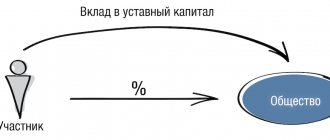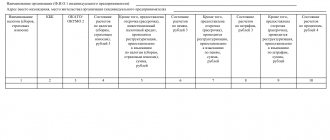Refund of tax overpayment is an important issue for every individual entrepreneur. And advice on how to do this is given by Ekaterina Nalivaiko, a certified lawyer, tax and real estate specialist, who has been in private practice since 2005.
Entrepreneurs often overpay taxes due to ignorance of the intricacies of tax legislation or incorrect filling out of tax returns. Overpayment can occur regardless of which tax system you work on - simplified, imputed, patent or any other.
Why does an individual entrepreneur overpay taxes?
Of course, no one will deliberately deduct excess tax. As a rule, the cause of this phenomenon is trivial errors, for example, in calculating the tax itself or in filling out the payment order form.
In addition, overpayment is possible for other reasons:
- The entrepreneur was not aware of the special reduced rate under the simplified tax system “Income minus expenses”, which is valid in the corresponding region, and paid tax at a rate of 15%.
- A declaration was submitted with clarifications for the previous period, due to which the payment was due in a smaller amount.
- Preferential conditions that were available for use, for example, from the beginning of this year, and were introduced by regional authorities later.
- Under the simplified tax system “Income minus expenses,” the entrepreneur transferred more funds in quarterly advance payments throughout the year than is required for the final tax amount for the annual period.
- Lack of awareness that a specific type of activity is subject to preferential taxation.
Top 3 articles that will be useful to every manager:
- How to choose a tax system to save on payments
- How to minimize taxes and not interest the tax authorities
- How to create an electronic signature quickly and easily
How to find out about overpayment of taxes as an individual entrepreneur
There are two ways to clarify this issue: receive a notification from the Federal Tax Service or deal with it yourself (through the taxpayer’s personal account).
- Notification from the Federal Tax Service
May take the form of a telephone call. For example, at the Federal Tax Service they found an overpayment and call you on your mobile, introducing themselves something like this: “Hello, this is the tax office.” In this case, be sure to write down which branch you are calling from and what tax was paid in excess. Pay special attention to recording the phone number or address of the branch where your overpayment was detected.
If excess tax is detected, the Federal Tax Service may require documentation, such as acts, contracts, invoices and even a cash register for double-checking. There is no point in obstructing, because these measures serve your interests, and, moreover, refusal to implement them can result in a fine of about 10,000 rubles. And the sooner you provide the data and allow the tax inspectorate to clarify everything, the sooner you can return the erroneously transferred funds.
- Taxpayer personal account
You can use your personal account on the official website of the Federal Tax Service; Among other things, it helps to find out whether overpayments exist and monitor the progress of applications for their return. If you have an EDS (electronic digital signature), you will be able to transfer your reporting and contacts with the tax office into digital format, giving up paper documents and personal visits.
Just register on the Federal Tax Service website and you will be able to track the entire progress of your tax payments in your personal account.
There is another way. You can clarify the existence of an overpayment and return it through a personal visit to the tax office and the Russian Post. If it is more convenient for you to personally ask for information and have all relationships fixed on paper, you can choose this path. Just while reading the article, replace “electronic appeals” with “visiting the tax office at the place of registration” and “letter with a list of attachments” - in general, the algorithm is common.
How to return overpayment of taxes to individual entrepreneurs: step-by-step instructions
We provide step-by-step instructions to help you, which will tell you how an individual entrepreneur can return an overpayment for the simplified tax system, UTII and in other cases.
Step 1. Reconciliation with the Federal Tax Service
Determine the amount of overpaid funds. This is carried out through reconciliation of mutual settlements (and execution of the appropriate act).
The act of reconciliation with the tax service has a regulated form. To obtain such a document, the taxpayer needs to write an application and submit it to his Federal Tax Service office.
The application can be drawn up in free form; make sure that it contains the main elements:
- full designation of the Federal Tax Service body, its address;
- information about the tax payer (last name, first name and patronymic, TIN, address, contact telephone number);
- reconciliation parameters (period subject to reconciliation; type of taxation – UTII, simplified tax system, etc.);
- method of receiving the reconciliation report (by mail or in person at the tax office);
- date of writing the application.
Having submitted such an application, the entrepreneur will receive a reconciliation report within five working days. The document will be provided in 2 copies and completed by the Federal Tax Service. Enter your part of the data into it (in accordance with how payments were actually accrued and made), sign. Provide one copy to the tax office, the second remains for you.
The amount of tax overpayment can be seen in the line called “Positive Balance”.
The calculations will be reconciled, the data on them will be agreed upon, and the amount to be returned will be confirmed when the positive balance indicators from both the tax service and the entrepreneur are the same.
Evidence of overpayment
The FAS Moscow District noted that the reconciliation report is not sufficient evidence of an overpayment, since in tax legislation such a document is not used to formalize the detection of an overpayment (resolution No. A41-30487/11 dated September 7, 2012). In addition, drawing up a reconciliation report is not a prerequisite for a tax refund.
In the event of a dispute with the inspectorate, the fact of overpayment must be confirmed by evidence, in particular payment orders or information about the taxpayer’s fulfillment of the obligation to pay taxes contained in the inspectorate’s database.
How to return overpayment of taxes to an individual entrepreneur through a tax agent (in terms of personal income tax)
If a tax agent withholds excess personal income tax from your income, it is this agent who must return it himself (grounds: clause 14 of article 78, clause 1 of article 231 of the Tax Code of the Russian Federation; clause 34 of the Resolution of the Plenum of the Supreme Arbitration Court of the Russian Federation dated July 30, 2013 No. 57). This refers to the return of personal income tax collected incorrectly as a result of an error. For example, the accountant withheld the appropriate percentage of earnings from income that is not subject to taxation.
What should your actions be in this case? Here's an algorithm to help.
Stage 1. Submitting an application to the tax agent.
There is no regulated form, write freely. Be sure to indicate the bank account number where your funds should be transferred. The employer, by law, has the right to return overpaid taxes only by non-cash means (Clause 1, Article 231 of the Tax Code of the Russian Federation).
Application deadlines are limited: an application can be submitted within three years from the date of transfer of the excessively collected amount to the state budget.
Please note that your ability to get your money back will not be affected by whether you are still employed by the company or have already left.
Stage 2. Receipt of erroneously withheld personal income tax (to the designated account).
The employer is obliged to return the funds no later than three months from the receipt of the application by the employer. If after the specified period the money has not been received into the account, you are additionally entitled to a certain percentage for each overdue calendar day. The size of this percentage will be determined by the current refinancing rate of the Central Bank of the Russian Federation (basis: paragraph 3, 5, paragraph 1 of Article 231 of the Tax Code of the Russian Federation).
Offset of tax overpayment
In addition to returning funds to the current account, the taxpayer has the opportunity to dispose of the tax overpayment in another way, namely, to offset it against upcoming payments (clause 4 of Article 78 of the Tax Code of the Russian Federation) or against arrears. As for procedural issues, that is, the deadlines for submitting the relevant application and making a decision by the inspectors, in this case everything is similar to the tax refund procedure. True, interest is not accrued for late offset of overpaid tax (resolution of the Federal Antimonopoly Service of the West Siberian District dated July 7, 2008 in case No. F04-4079/2008(7607-A46-26), the Thirteenth Arbitration Court of Appeal dated December 9, 2008 in the case No. A56-14347/2008, Tenth Arbitration Court of Appeal dated February 13, 2009 in case No. A41-21803/08).
It should be remembered that, according to paragraph 1 of Article 78 of the Tax Code of the Russian Federation, the offset of amounts of overpaid federal taxes and fees, regional and local taxes is carried out according to the corresponding types of taxes and fees, as well as penalties accrued on the corresponding taxes and fees. In other words, federal taxes are counted against federal taxes, regional taxes are counted against regional taxes, local taxes are counted against local taxes (letters from the Ministry of Finance dated December 30, 2011 No. 03-07-11/362, dated September 22, 2008 No. 03-02-07/ 1-370, dated October 2, 2008 No. 03-02-07/1-387, dated January 11, 2009 No. 03-02-07/1-3). In turn, the level of the budget into which the tax is credited does not matter (letter of the Ministry of Finance dated April 26, 2011 No. 03-02-07/1-141).
The decision to partially offset the overpayment, in the opinion of the majority of arbitrators, does not interrupt the limitation period for filing a claim with the court for the return of the remaining amount of the overpayment. The Federal Antimonopoly Service of the Volga-Vyatka District, in its resolution dated December 24, 2009 No. A17-7871/2008, noted that partial offset of overpaid tax amounts does not lead to legal consequences, since civil law norms do not apply to tax legal relations. Thus, the fact of offset of overpayment amounts does not indicate an interruption of the limitation period according to the rules of Article 203 of the Civil Code of the Russian Federation. But there is also the opposite opinion. In particular, the Federal Antimonopoly Service of the Ural District, in resolution No. F09-4075/10-S3 dated June 3, 2010, indicated that the tax authorities’ offset of overpaid tax, which was subsequently declared illegal by a higher tax authority, interrupts the statute of limitations.
Nuances of refunding overpayments on taxes for individual entrepreneurs
1. First of all, find out which Federal Tax Service you need to contact.
This will depend on your place of registration, the region where you operate, and the type of taxation you prefer.
For the most part, taxes are paid at the place of registration of the individual entrepreneur, which is based on his registration. For example, a person is registered in the Tver region, which means that his registration as an individual entrepreneur will be attached to this region. At the same time, he can carry out activities in the Nizhny Novgorod region, but he will still fulfill tax obligations in Tverskaya.
Registration of an individual entrepreneur at the place of his official residence does not at all limit the field of his activities - it can be freely carried out within the entire Russian Federation. You will not need to change your place of registration for this.
An entrepreneur's tax obligations correspond to the rate of the region where he is registered. For example, an individual entrepreneur chose the simplified tax system and registered in Crimea, where he is registered. He runs his business in Moscow. The tax rate in Crimea is 3%, and in Moscow 6%. Tax payments are subject to a rate of 3%. If they are carried out at the place of business (6%), the individual entrepreneur pays them in error and in excess.
However, some entrepreneurs are entitled to tax binding to another region. When are there exceptions?
- Patent applies. In this case, the individual entrepreneur is subordinated to the tax inspectorate at the place where the patent was acquired. In addition, there cannot be an overpayment here, because tax obligations in this option are fixed and are included in the initial cost. At the same time, all other taxes continue to be paid in accordance with the region of residence of the individual entrepreneur.
- UTII is applied. Here you will need to register only with the tax office whose jurisdiction is indicated first in your application to conduct business. However, you will need to submit reports to different inspectorates - according to the regions of the country or intra-city territories that have separate tax authorities where you conduct your business.
- The simplified tax system is applied, commercial real estate has been purchased where the activity is carried out. In this situation, registration is required at the place of purchase - there you will pay taxes on the real estate itself, and others - as before, at the place of your registration.
The taxation system that applies in your case can be clarified in the taxpayer’s personal account.
Important Note:
If there was an overpayment, and you registered with several inspectorates, to get the money back, contact exactly the one where the excess payment was sent.
2. Be sure to assist the Federal Tax Service in establishing the overpayment.
Reconciliation with the budget (as well as a certificate of the status of settlements) will help with this. These measures are not mandatory, but help confirm the excess tax payment and return it sooner.
Reconciliation of your calculations with the budget is information about how much money you were supposed to transfer over a certain period and how much was actually paid. For example, in 2021, tax liabilities amounted to 25,000 rubles - and you (let’s say, by mistake) sent 250,000 rubles. All this will be reflected.
It is convenient to carry out such a verification procedure from your personal account. In the “Calculations with the budget” section, select “Submit an application to initiate the procedure...”, and then follow the algorithm that will be proposed.
3. Reconciliation will take 10-15 business days.
You can request a certificate about the status of your payments to the budget. It is not related to the reconciliation process and may well be issued in parallel. This document reflects overpayments and debts as of a specific calendar date. You can also request it from your personal account: in the “Get a certificate” section, click “Get a certificate on the status of tax payments...”, then follow the instructions.
4. Preparation of the certificate takes approximately 5 working days.
Don't agree to re-apply. It may happen that an individual entrepreneur submits an application for a refund of the overpayment, then an act of reconciliation of mutual settlements with the Federal Tax Service - and at this moment he is sent to write a new application. Refuse: according to the law, one is enough.
The timing of the decision on the refund of funds will depend on whether you submitted your application immediately with a reconciliation report or initially without it, that is, in two stages.
- If both documents are submitted at once (and also if the tax office does not find it necessary to check), the decision will be made within 10 days.
- If the tax office conducts an audit, the result will take 20–25 days.
When talking about the three-year allowable period within which an overpayment can be returned, the starting point does not mean the date of discovery of the tax surplus or submission of the application, but the date of submission of the declaration.
The result of your request, as well as the status of its consideration, can be tracked through your personal account.
Let us remind you once again: the refunded funds will arrive approximately a month after a positive decision.
If this period has expired and the money has not arrived in the current account, the Federal Tax Service will pay you interest for each overdue day. The percentage will depend on the current refinancing rate of the Central Bank (for example, 7.75% per annum).
How to return overpayment of taxes to an individual entrepreneur if it is closed
If you sent an excess payment before the termination of your activity, again try to return the funds through an application to the Federal Tax Service. The tax surplus will be transferred according to the details that you provide in this application. In this case, a debit card will also work.
In this case, the reconciliation should be ordered through the tax service using a separate document flow system.
How to return overpayment of taxes to an individual entrepreneur after closure? You can also use your taxpayer account. However, in case of termination of activity, the entrepreneur will still need to personally visit the Federal Tax Service to reconcile mutual settlements. Do not forget that the application must be filled out and printed in duplicate.
One of them is handed over personally to the authorized inspector, and the other serves to confirm the acceptance of the first - it must be returned with a special mark with the date. It is mandatory to have your passport with you. The inspection will prepare a reconciliation report within five days.
The document will be sent to you by mail, or you will be notified that it is ready for personal receipt. It happens that the tax reconciliation result is given on the day of application. If he confirms the absence of both debt and overpayment, everything is in order. If a debt is discovered, you can calmly pay it off; it will be registered with you as an individual outside of entrepreneurial activity.
If you find out that you overpaid, the news is also good: most likely, with simple steps you will return the funds back. Send the received reconciliation report to the Federal Tax Service along with a separate application for a refund of overpaid tax. Overpayment will be refunded.
An application of this type can be submitted within three years from the date of transfer of the excess payment. For example, the overpayment occurred in 2021, and the termination of activity in 2019. You can request a refund until 2021.
So, how to return the overpayment of taxes to an individual entrepreneur when he closes his activities? The application is fully prepared, duplicated, both copies are submitted to the tax office at your place of residence, one is immediately returned to you (with a stamp of acceptance and date). Refusal is not allowed.
The Tax Office will review your application within 10 days and provide a decision. If the overpayment is confirmed, it must be returned to you within one month. In practice, however, things may be different.
Procedure for filling out an application
Currently, a form approved from March 31, 2021 is used to apply for a credit for overpaid tax. The document is filled out with a header indicating the TIN and KPP of the organization or individual entrepreneur. If the application is submitted by an organization, then the two empty cells in the TIN are crossed out, and if the application is an entrepreneur, then the field for filling out the checkpoint is completely crossed out. The page number is indicated next to it, for example, for the title page - “001”.
After this, the “Application Number” is indicated, which indicates the time the taxpayer applies for the offset during the current year. The code of the tax office to which the application for credit is submitted is also entered. Next, fill in the full name of the company, or the full name of the individual entrepreneur.
After this, indicate the article of the Tax Code of the Russian Federation, on the basis of which the offset is made. In case of offset of overpaid tax, Article 78 of the Tax Code of the Russian Federation is indicated. The following is information about the score. Moreover, first the amount that the taxpayer requests for offset is recorded, and then the period in which the overpayment occurred is noted. This field consists of three blocks, which are separated by dots:
- The first two cells indicate “MS”, “CV”, “PL” or “GD” if the period is a month, quarter, half-year or year.
- The next two cells are needed to clarify the period number. If it is a quarter, then from 01 to 04, if it is a half-year, then 01 or 02, and if it is a year, then simply zeros are written down.
- The last cells indicate the year.
Please enter the credit code below. In this case, “1” is set if it is planned to use the overpayment amount to repay the existing debt, and “2” if it is planned to repay future payments.
The second block contains information about what the overpayment will be used for, the codes are indicated:
- period (for which period the overpaid tax of the simplified tax system is transferred);
- OKTMO;
- KBK to which the overpayment is transferred.
The BCC may be the same as the previous code or different from it, for example, if the offset is carried out for a different tax. The last to be filled in are the columns indicating the number of sheets in the application and the number of application sheets. At the bottom, the application is divided into two columns, the left of which is filled out by the taxpayer. Here indicate the full name of the person submitting the application, his telephone number, date and signature.
Delays in returning overpaid taxes for individual entrepreneurs
The tax office may not provide you with a decision on time for various reasons: the application was lost, it was not possible to consider it within the required period, there was a glitch in the program, etc. Not 10, but 15 days have passed - no response has been received? Submit another application with a request to issue you a decision from the Federal Tax Service (this is done through the same taxpayer account).
Do they unmotivatedly refuse to return your funds or leave you without an answer even after the second application? File a complaint with the Federal Tax Service, which manages all territorial divisions. Your personal account on the website will again help with this: find the “Contact the tax authority” section, where you click “Write a request” and follow the instructions.
If this measure does not bring results, you should contact the Arbitration Court. This can be done no later than three years from the date the overpayment was established.
How much can I get back?
The entire tax surplus must be returned by law. However, if you have a parallel debt, the tax office can pay it off with overpayments and, accordingly, deduct this amount from the refund.
At the same time, keep in mind that both issues can be resolved with such a convenient offset only with taxes of the same type. For example, in 2019 you overpaid income tax, but for 2021 you still owe the same - the tax office will make a offset and send a notification about this within 5 days (track it in your personal account).
The situation is completely different if the overpayment occurred for income tax, and the debt was for property tax. Here you cannot cover one with the other. The overpayment can be returned, but the debt will remain and will be supplemented by penalties. It will have to be repaid separately.
Do you want to speed up the offset or cover the debt for one tax with the excess paid from another? Write this when you apply for a refund: just add in free form that you are asking to use the overpayment to pay off debts. If the latter exceeds the overpayment, specify what debts you are asking for it to be used to repay.
Thus, the entire excess payment may be used to cover the existing tax debt, and nothing will be transferred to you. But the size of the debt will decrease.
Which is more profitable?
I recommend that you offset the overpayment if its amount is small or approximately comparable to upcoming payments.
For example, you have an overpayment of tax on the simplified tax system of 10,000 rubles. For the second quarter of 2021, you plan to pay an advance payment of 8,000 rubles. In this case, it is best to choose an offset.
If the overpayment amount is significant, for example, 100,000 rubles, or you do not plan to make advance payments in the near future, for example, due to coronavirus, I recommend returning the overpayment.
How to return overpayment of taxes to individual entrepreneurs if more than 3 years have passed
Option 1. Go to court
If the excess payment is determined after the 3-year refund period has already expired, try the following to resolve the problem:
Step 1: Prepare evidence of when the overpayment was discovered (specific date).
Step 2. Submit a motivated application to the tax office to return or offset the overpaid funds.
Step 3. File a claim with the court within three months. This period is counted:
- or from the moment when they received a refusal from the Federal Tax Service to return or offset the funds;
- or from the moment when 10 days have elapsed from your submission of the application, and no official response has been received.
If you want to get back money you overpaid due to an incorrect withholding by the IRS rather than your own error, the process is the same.
Option 2. Write off the debt amount
If the court legally refused to return the overdue tax surplus due to the expiration of the statute of limitations (or the entrepreneur simply decided not to initiate legal proceedings), the existing overpayment can be used to pay off the current income tax. An individual entrepreneur’s application is not necessary for this.
The Federal Tax Service does not have the right to write off an outdated overpayment, at least for those taxpayers who did not request this, but continue to conduct their business and submit reports on it on time (grounds: Letter of the Federal Tax Service of Russia dated November 1, 2013 No. ND-4-8/ [ email protected] ).
Possible consequences for unrefunded overpayment of taxes for individual entrepreneurs
What happens if you do not file the excess tax refund? No penalties will be charged and no penalties will follow.
Most likely, your inspectorate will take this excess into account in a future period of the same tax. For example, in 2021 you overpaid transport tax; You did not submit an application to return it. In this case, the Federal Tax Service will simply reduce your transport tax for 2021 by this amount.
If you stopped using corporate transport and, accordingly, paying tax on it, and did not return the overpayment, the tax office will not take any action against it in the new period. Here you have three years from the date of payment of the excess to return it or take it into account in another form of tax. If you don't do this, the money will simply disappear.
Is that exactly what happened? Then it is better to write off the outdated overpayment under the guise of a “bad debt.” This is the name of the amount that cannot be returned for objective reasons, such as the bankruptcy of the debtor company or the expiration of the permissible statute of limitations.
In accounting, a written-off debt is treated as an expense that is covered by income, resulting in the convergence of debits and credits. As a result, the amount of income subject to taxes decreases. The Federal Tax Service perceives debt write-off as a reduction in tax payments, so it carefully checks (sometimes more than once) cases of loss write-off.
The order of the Ministry of Finance on accounting allows you to write off a non-refundable overpayment as a bad debt, but in a real situation of this kind you may be refused. Here the actions will depend on the amount in question and whether it would be beneficial for you to have it written off. If the answer is yes, enlist the help of qualified lawyers and accountants who will bring this issue to a victorious conclusion.
How to return an overpayment of taxes to an individual entrepreneur if the tax office refuses to issue a refund
If the inspection delays its response, which is why you cannot return the funds, do not waste time - act.
First, check what payment details you provided on your application. You still have one copy, you can easily check this information for errors. If they simply did not accept your application during a personal visit, this is illegal action. Send it to the tax office anyway, for which you have two ways: a registered letter (with notification of delivery to the sender) and an online application (available only with a qualified digital signature).
If you are not given a decision, in a dialogue with a representative of the Federal Tax Service, mention the period indicated in the Tax Code of the Russian Federation within which the overpayment is supposed to be returned - 1 month from the date of receipt of the application. This period has expired and the situation has not changed? Write complaints to a higher authority. Please submit this only by letter (with acknowledgment of delivery).
The Federal Tax Service should answer you in the same way, in writing. It will not be possible to return the funds more quickly by calling by phone: these dialogues will not be recorded, you may be given false information, and you will not be able to attach the result of such an appeal to court proceedings.
All the deadlines have passed, but you don’t have a definite answer, and you also couldn’t get your money back? You will have to draw up a statement of claim and send it to the court. This document includes a requirement to pay the tax surplus with interest for late payments.
Note that such lawsuits are usually won by taxpayers. As a rule, the court takes the side of the Federal Tax Service only in cases of incorrectly completed documents that were submitted for the return of overpayments.
If deadlines are missed
In such a situation, as already noted, you are entitled to interest. You don't have to do anything yourself. The tax office itself calculates and returns them.
Interest is accrued from the next day after the expiration of the monthly period for repayment of the overpayment up to and including the day of repayment.
To calculate interest, the formula is used:
If the refinancing rate has changed during the delay, then interest for periods with different rates is calculated separately.
If you are entitled to interest, but it has not been paid, then you should complain. First, to the higher tax authority. If it doesn’t help, then you need to go to court.






